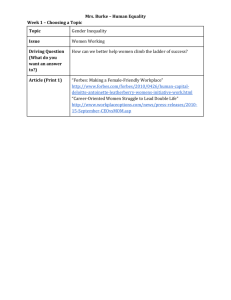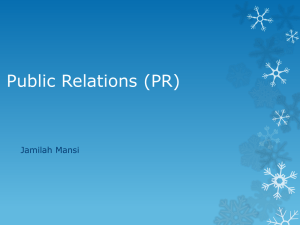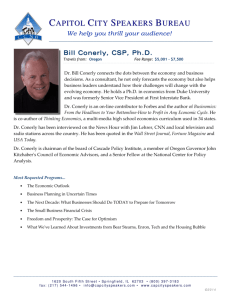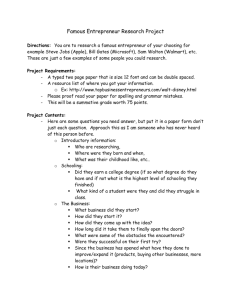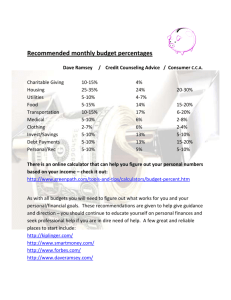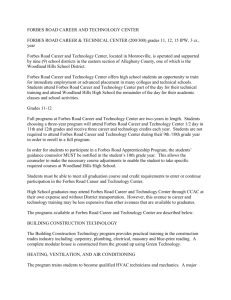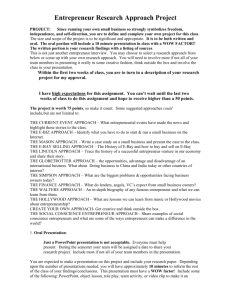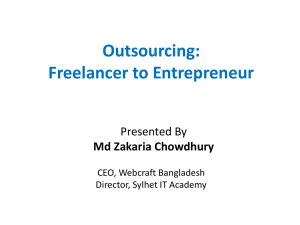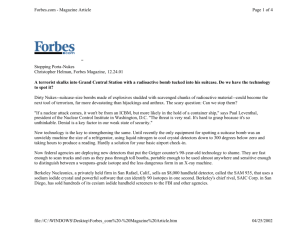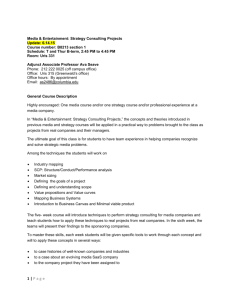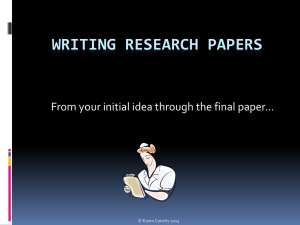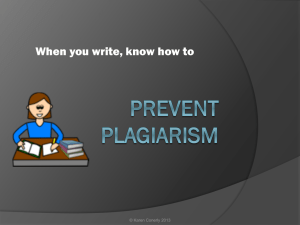Writing Sample 2 - Editing by Kiersten
advertisement
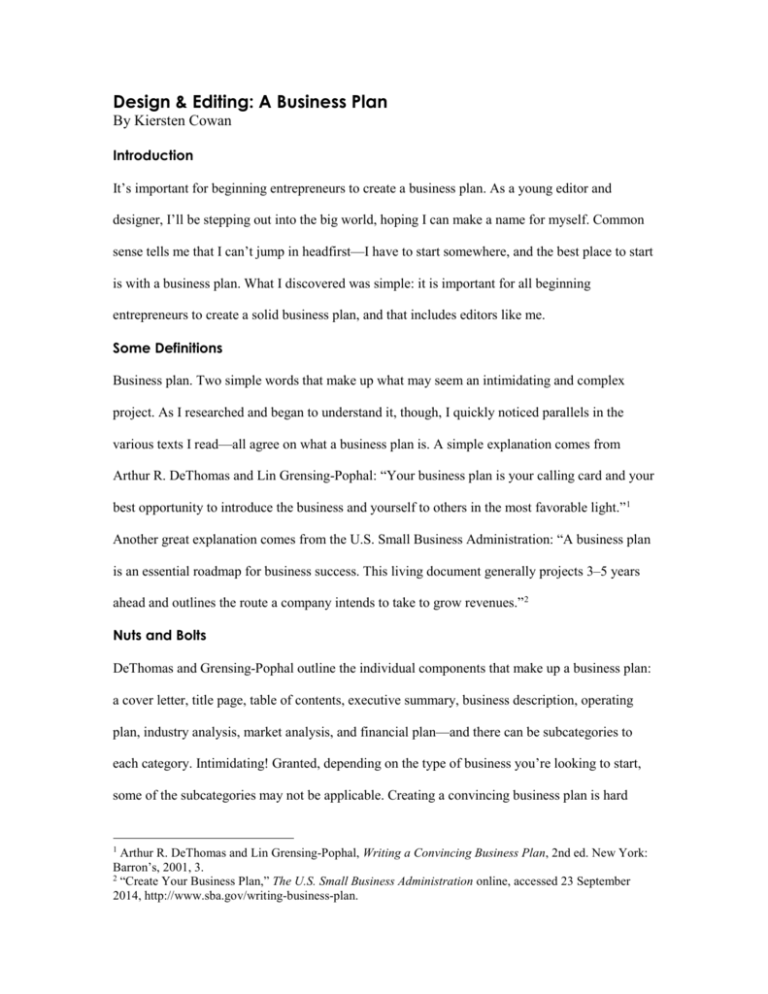
Design & Editing: A Business Plan By Kiersten Cowan Introduction It’s important for beginning entrepreneurs to create a business plan. As a young editor and designer, I’ll be stepping out into the big world, hoping I can make a name for myself. Common sense tells me that I can’t jump in headfirst—I have to start somewhere, and the best place to start is with a business plan. What I discovered was simple: it is important for all beginning entrepreneurs to create a solid business plan, and that includes editors like me. Some Definitions Business plan. Two simple words that make up what may seem an intimidating and complex project. As I researched and began to understand it, though, I quickly noticed parallels in the various texts I read—all agree on what a business plan is. A simple explanation comes from Arthur R. DeThomas and Lin Grensing-Pophal: “Your business plan is your calling card and your best opportunity to introduce the business and yourself to others in the most favorable light.” 1 Another great explanation comes from the U.S. Small Business Administration: “A business plan is an essential roadmap for business success. This living document generally projects 3–5 years ahead and outlines the route a company intends to take to grow revenues.” 2 Nuts and Bolts DeThomas and Grensing-Pophal outline the individual components that make up a business plan: a cover letter, title page, table of contents, executive summary, business description, operating plan, industry analysis, market analysis, and financial plan—and there can be subcategories to each category. Intimidating! Granted, depending on the type of business you’re looking to start, some of the subcategories may not be applicable. Creating a convincing business plan is hard 1 Arthur R. DeThomas and Lin Grensing-Pophal, Writing a Convincing Business Plan, 2nd ed. New York: Barron’s, 2001, 3. 2 “Create Your Business Plan,” The U.S. Small Business Administration online, accessed 23 September 2014, http://www.sba.gov/writing-business-plan. work, but it’s worth it. Vision and Goals For my sake as a freelance editor and designer, the most important categories I want to address in my business plan are the following: cover letter, summary, business description, industry analysis, market analysis, and financial plan. It will take research and forethought to create a successful business plan unique to me and my goals. Right away, two things I want to focus on in my plan are marketing strategies and targeting customers—I need to fine my niche. Thankfully, The Wealthy Freelancer counsels you and me on how to do just that by “discover[ing] what you have to offer, identify[ing] the market you’ll serve, and position[ing] yourself in the market.” 3 This process will take time, but the end results will be rewarding. But five components still sounds hefty. Some of these are necessary, like the summary and business description. For example, my description details what is unique about what I do (copyediting and design), and whom I target (currently, not authors of scholarly text). And my summary—if a potential client is interested in reading it—educates readers on what I do, my basic prices, and establishes me as a serious professional worthy of good clients. Financial Facts If you do not create a business plan and jump in headfirst to starting a business, you run some risks. Some consequences include “missing sales projections because you don’t really know who your customers are and what they want,” “becoming overwhelmed by too many options because you never took the time to focus on a mission and the vision for your company,” and “going bankrupt because you don’t have a rational business model or a plan for how to make money.” 4 Yikes! Despite the work, a business plan suddenly sounds enticing. And if those warnings don’t work, think of this: If you write a business plan, you are two times more likely to get into 3 Steve Slaunwhite, Pete Savage, and Ed Gandia, The Wealthy Freelancer, New York: Alpha, 2010, 148. Steven D. Peterson, Peter E. Jaret and Barbara Findlay Schenck, “Why is a Business Plan Important? For Dummies online, http://www.dummies.com/how-to/content/why-is-a-business-plan-important.html 4 business. 5 While there are lots of things that make up a business plan they are all important. And it’s important to create a business plan before starting a freelance career because, in another sense, a business plan is a detailed document(s) of goals. In one Forbes article, Bill Conerly says, “The value of the goal is not the goal itself, but the determination of the action steps most likely to lead to achieving the goal.” 6 Writing down the goal (business plan) gives you a clear sightline to what you want. So not only should you write a business plan, but you should write it well. “Plans today no longer need the 20 to 40 pages prescribed by classic planners. . . . [Devote] no more than five pages to income, cash flow and balance sheets.” 7 My business plan is something I will look at often; I do not want to bog myself and others down with a thick, wordy document. (I don’t plan on presenting my business plan to investors, which is what most authors say is purpose of a business plan.) 8 Conclusion There are many resources available to you and me on starting a business and writing a business plan. If I do the research and write the plan, I will be that much better off—I won’t take baby steps into the big world, I’ll leap! 5 “An Introduction to Business Plans,” Entrepreneur online, accessed 23 September 2014 www.entrepreneur.com/article/198618 6 Bill Conerly, “Setting Business Goals: It Doesn’t Have To Be A Waste of Time,” Forbes online, May 17, 2013, http://www.forbes.com/sites/billconerly/2013/05/17/setting-business-goals-it-doesnt-have-to-be-awaste-of-time/ 7 Ibid. 8 Gary A. Cooper, The Business Plan Workbook, New Jersey: Prentice Hall, 1989, 1. Works Cited “An Introduction to Business Plans.” Entrepreneur online. Accessed 23 September 2014. www.entrepreneur.com/article/198618 Conerly, Bill. “Setting Business Goals: It Doesn’t Have To Be A Waste of Time.” Forbes online. May 17, 2013, http://www.forbes.com/sites/billconerly/2013/05/17/setting-businessgoals-it-doesnt-have-to-be-a-waste-of-time/ Cooper, Gary A. The Business Plan Workbook. New Jersey: Prentice Hall, 1989. DeThomas, Arthur R. and Lin Grensing-Pophal. Writing a Convincing Business Plan, 2nd ed. New York: Barron’s, 2001. Peterson, Steven D., Peter E. Jaret and Barbara Findlay Schenck. “Why is a Business Plan Important? For Dummies online. http://www.dummies.com/how-to/content/why-is-abusiness-plan-important.html Slaunwhite, Steve, Pete Savage, and Ed Gandia. The Wealthy Freelancer. New York: Alpha, 2010.
